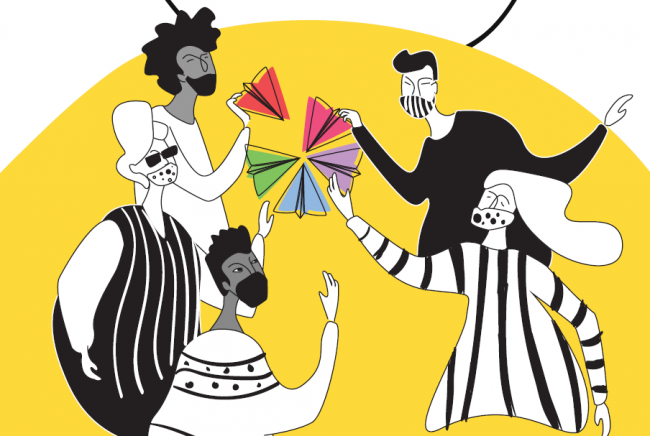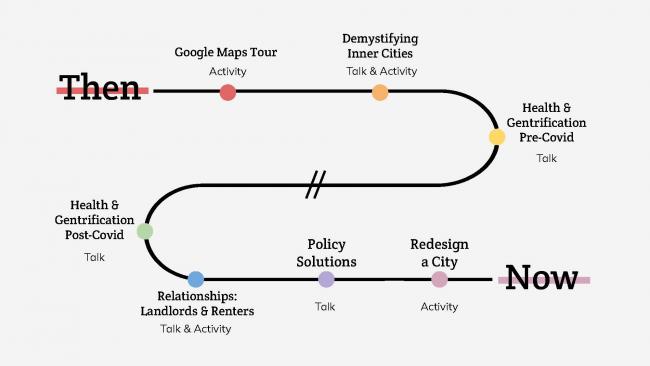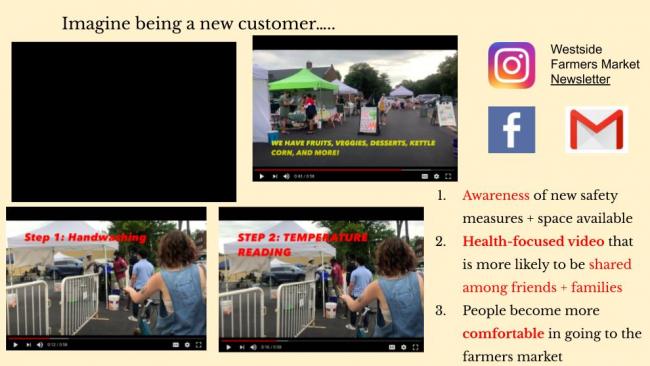
One of the most devastating aspects of COVID-19 is its ubiquity. Everyone who is not battling the virus itself is living in its shadow. That omnipresent threat has wreaked havoc on almost every aspect of everyday life.
For example, slowing the coronavirus’s spread has required businesses and organizations to adopt crippling, if not ruinous, physical distancing practices. And Rochester’s professional community has not been immune to this adversity. In typical fashion, the University of Rochester embraced the problem as an opportunity for innovation. The problem became the COVID-19 Challenge.
A collaboration between the Ain Center for Entrepreneurship, Barbara J. Burger iZone, Grand Challenges Scholars Program, Greene Center for Career Education and Connections, and Center for Community Engagement, the challenge was created to give students the opportunity to build competencies and gain valuable experience while fighting the effects that the pandemic is having on the City of Rochester.
The challenge (entirely virtual): Working in teams, students have 10 days to develop ways to address an actual problem faced by one of four community partners.
The community partners: 540WMain, Inc., KeyBank Rochester Fringe Festival, M.K. Gandhi Institute for Nonviolence, and Westside Farmers Market.
The prize: $1500 to first place; $500 to the runner-up.
Deniz Cengiz ʼ21, a Karp Library Fellow at iZone, explained that at the outset, they were preparing for a competition that would include one community partner and as many as 10 teams. Then they opened registration, and it blew up.
“I think we had about 150 applications,” says Cengiz, who served as the community partner liaison. “We had PhD students from the Medical Center. We had all levels of undergrads. We had incoming freshmen who hadn’t even been to Rochester yet. We really weren’t expecting this many students, and realized we had to add more partners.”
When the dust settled, there were around 42 teams—about 10 for each community partner, who had specific problems students had to address. And it quickly became clear that the community partners were as enthusiastic about and engaged in this challenge as the students.
“They were incredibly involved,” says Cengiz of the partners. “I would say they gave 20 to 25 hours of their time over the 10-day period. They deserve a lot of credit.”
Students used the 20-plus hours given by the partners on problem-solving communication. That communication included email correspondence and “office hours,” which served as dedicated time for teams to get more information about the organization, more details about the organization’s problem, and to talk through some initial ideas for solutions.
In the end, there may have only been two official winners, but it’s clear there were no losers. Even the teams who didn’t come out on top were grateful for having the close working experience with their respective organizations. The partners equally enjoyed collaborating with the students. Cengiz shared that feedback on the challenge was “overwhelmingly positive.”
“Basically, everybody wants to keep working together,” says Cengiz.
The challenge ended with a “pitch day,” where all the teams gave presentations to their respective organizations. Each organization then chose a finalist from their group, who would pitch to all the partners at once. Finally, the partners choose the top two from the final four. Those teams were…
WINNER: Team Duo
Team members: Casey Ryu ʼ21 and Ilene Kang ʼ21
Community partner: 540WMain, Inc.
Problem: 540WMain needed to completely reimagine their normally in-person Gentrification Conference for a virtual space, in a way that would retain their audience, create discussion and connection opportunities, and deliver engaging content. This year’s theme was to be “Resisting Gentrification: Then & Now.”
Solution: Lean into the theme. Team Duo proposed extending the conference from one to two days. The extra day allowed the conference to focus entire days on concepts of “Then” and “Now” by walking through four topic areas—investment and policy, demystifying inner cities, landlord and renter relationships, and health and gentrification (pre- and post-COVID). The result was a mix of talks and activities with virtual and in-person options.

Activity examples: Redesign a gentrified city using Legos (in-person) or take a virtual Google Street View-Tour through gentrified areas—then and now.
Talk example: Health issues exacerbated by COVID-19 in communities of color.
“This was a great way—even virtually, from across the country—that a bunch of students could come together and try and develop ideas for these different partner organizations,” says Ryu.
Ryu and Kang are now officially part of the planning committee for the conference, which has been rescheduled for April 9 and 10, 2021.
“I was immediately impressed by their thoughtful questions and attention to detail,” said Calvin Eaton, founder and director of 540WMain, Inc. “It was clear their enthusiasm was genuine and that they had an interest in working with 540 beyond the scope of the challenge. Their professionalism and creativity truly made them stand out.”
RUNNER-UP: Team BriKarSoo
Team members: Brian Perez ʼ22, Karlin Li ʼ22, and Soomin Park ʼ23
Community partner: Westside Farmers Market
Problem: Adhering to COVID-19 guidelines has resulted in the loss of many fun aspects of the market (live music, the children’s tent, bike repair, etc.) that usually draw crowds, creating an imminent need for ways to bring in new customers and encourage regular customers to return. There’s also a great need for additional volunteers.
Solution: A multi-pronged approach that raises awareness of the market’s existence, educates potential visitors on how the market is functioning safely, and inspires engagement.

“It was really fun to come up with an original idea that would help people in the Rochester community,” said Karlin.
Education example: A video that creates the customer experience to provide a preview of what being at the market will be like
Engagement example: Various activities, including raffles and guessing competitions (think, jelly bean counting)
"It was great working with them,” says Lauren Caruso. “They contacted possible partners and made connections we wouldn't have. They also gave us some great ideas; we are implementing several of them to make our market better." ∎
For more information on the COVID-19 Challenge, contact Deniz Cengiz at dcengiz@u.rochester.edu. If you would like to hear more about the proposal for 540WMain contact, Casey Ryu at cryu@u.rochester.edu, and for the Westside Farmers Market proposal, contact Karlin Li at kli27@u.rochester.edu. Enjoy reading about the University of Rochester Libraries? Subscribe to Tower Talk.


